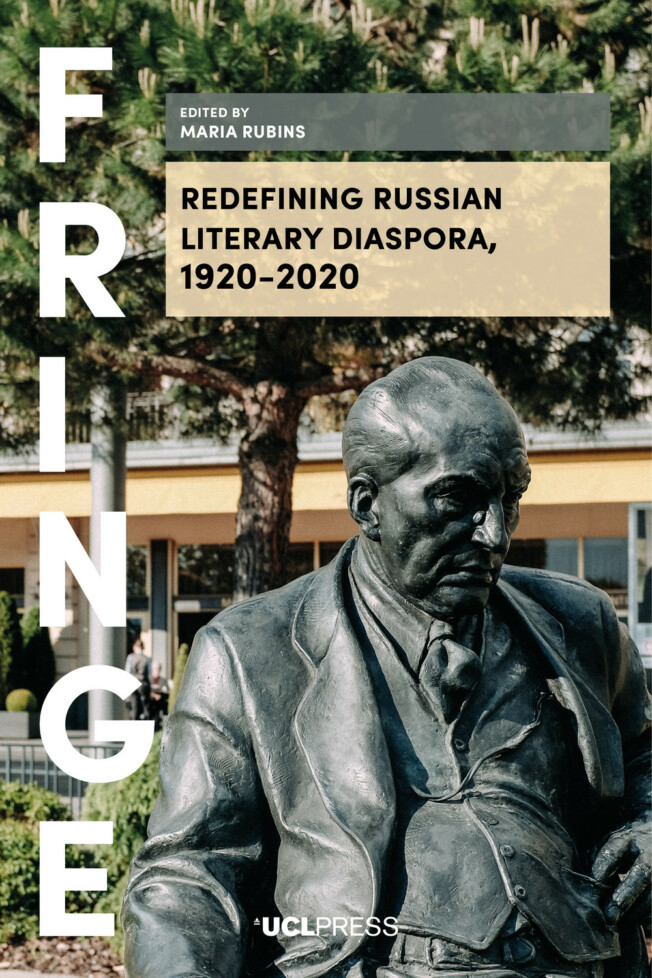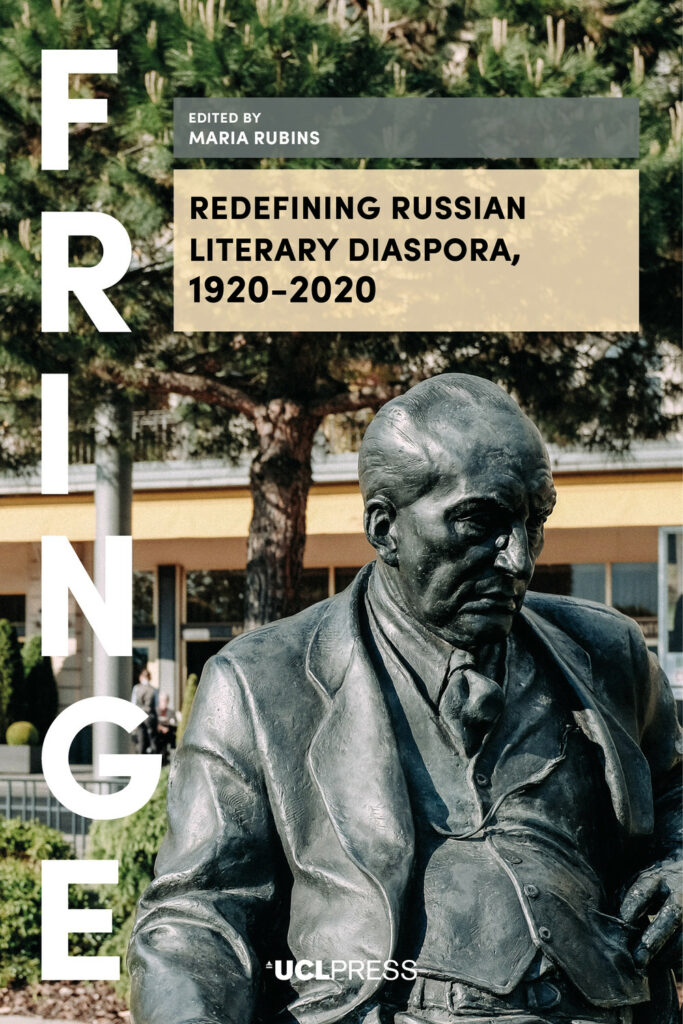
Redefining Russian Literary Diaspora, 1920-2020
Maria Rubins (Editor)
Series: FRINGE
Over the century that has passed since the start of the massive post-revolutionary exodus, Russian literature has thrived in multiple locations around the globe. What happens to cultural vocabularies, politics of identity, literary canon and language when writers transcend the metropolitan and national boundaries and begin to negotiate new experience gained in the process of migration?
Redefining Russian Literary Diaspora, 1920-2020 sets a new agenda for the study of Russian diaspora writing, countering its conventional reception as a subsidiary branch of national literature and reorienting the field from an excessive emphasis on the homeland and origins to an analysis of transnational circulations that shape extraterritorial cultural practices. Integrating a variety of conceptual perspectives, ranging from diaspora and postcolonial studies to the theories of translation and self-translation, World Literature and evolutionary literary criticism, the contributors argue for a distinct nature of diasporic literary expression predicated on hybridity, ambivalence and a sense of multiple belonging. As the complementary case studies demonstrate, diaspora narratives consistently recode historical memory, contest the mainstream discourses of Russianness, rewrite received cultural tropes and explore topics that have remained marginal or taboo in the homeland. These diverse discussions are framed by a focused examination of diaspora as a methodological perspective and its relevance for the modern human condition.
Praise for Redefining Russian Literary Diaspora, 1920-2020
‘Exile or diaspora? Russians or russophones? Hyphenated or post-colonial? This fascinating volume gathers together top specialists to discuss the critical questions that have emerged in Russian literary studies. It will prove to be foundational for the study of the new, de-centered Russian literature of the twenty-first century.’
J. Douglas Clayton, University of Ottawa
‘The consistently stimulating and erudite chapters enter into fruitful dialogue with contemporary theories of diaspora and globalization, indicating both points of concurrence as well as ways that the Russian experience diverges. An excellent and necessary book.’
Edythe Haber, Harvard University
‘Ranging across geographies and genres, a constellation of the world’s leading scholars of Russian culture rethink the nature of the canon, challenge durable myths and archetypes, and upend previously hierarchical relationships between supposed centres and peripheries.’
Philip Ross Bullock, University of Oxford
‘Redefining Russian Literary Diaspora, 1920–2020 successfully and convincingly makes the case for diasporic literature, noting its complexities and raising difficult questions which are tackled with sophistication and great tact.’
Slavonic and Eastern European Review
‘Those interested in exilic literature… will find in Rubins’s collection outstanding contributions by David Bethea, Pamela Davidson, and Adreas Schönle; students of diasporas, cultural centers, and peripheries will do well to consider Mark Lipovetsky’s and Kevin Platt’s essays while Rubins’s and Galin Tihanov’s framing pieces will not fail to stimulate much-needed thinking at a time when rampant archaism makes mockery of progress, enlightenment, and “global connectivity.”’
Slavic Review
Notes on contributors
Preface
Acknowledgements
Part one: Conceptual territories of ‘diaspora’: introduction
1 The unbearable lightness of being a diasporian: modes of writing and reading narratives of displacement
Maria Rubins
Part two: ‘Quest for significance’: performing diasporic Identities in transnational contexts
2 Exile as emotional, moral and ideological ambivalence: Nikolai Turgenev and the performance of political exile
Andreas Schonle
3 Rewriting the Russian literary tradition of prophecy in the diaspora: Bunin, Nabokov and Viacheslav Ivanov
Pamela Davidson
Part three: Evolutionary trajectories: adaptation, ‘Interbreeding’ and transcultural polyglossya
4 Translingual poetry and the boundaries of diaspora: the self-translations of Marina Tsvetaeva, Vladimir Nabokov and Joseph Brodsky
Adrian Wanner
5 Evolutionary biology and ‘writing the diaspora’: the cases of Theodosius Dobzhansky and Vladimir Nabokov
David Bethea
Part four: Imagined spaces of unity and difference
6 Repatriation of diasporic literature and the role of the poetry anthology in the construction of a diasporic canon
Katharine Hodgson
7 Is there room for diaspora literature in the internet age?
Mark Lipovetsky
8 The benefits of distance: extraterritoriality as cultural capital in the literary marketplace
Kevin M. F. Platt
Beyond diaspora? Brief remarks in lieu of an afterword
Galin Tihanov
Conclusion
Maria Rubins
Index
DOI: 10.14324/111.9781787359413
Publication date: 11 March 2021
PDF ISBN: 9781787359413
EPUB ISBN: 9781787359444
Hardback ISBN: 9781787359437
Paperback ISBN: 9781787359420
Maria Rubins (Editor)
Maria Rubins is Professor of Russian and Comparative Literature at UCL. Her books include Crossroad of Arts, Crossroad of Cultures (2000) and Russian Montparnasse (2015). She is also a literary critic, editor of annotated books of Russian émigré fiction, and translator from English and French into Russian, in particular of works by Elizabeth Gaskell, Judith Gautier, Irène Némirovsky and Arnaud Delalande.
‘Redefining Russian Literary Diaspora, 1920–2020 successfully and convincingly makes the case for diasporic literature, noting its complexities and raising difficult questions which are tackled with sophistication and great tact.’
Slavonic and Eastern European Review
‘Those interested in exilic literature… will find in Rubins’s collection outstanding contributions by David Bethea, Pamela Davidson, and Adreas Schönle; students of diasporas, cultural centers, and peripheries will do well to consider Mark Lipovetsky’s and Kevin Platt’s essays while Rubins’s and Galin Tihanov’s framing pieces will not fail to stimulate much-needed thinking at a time when rampant archaism makes mockery of progress, enlightenment, and “global connectivity.”’
Slavic Review
‘Given the controversies over national identity in the Putin era and increasingly diversified Russian communities abroad, this collection of essays is a timely, engaging publication.’
Choice
‘Exile or diaspora? Russians or russophones? Hyphenated or post-colonial? This fascinating volume gathers together top specialists to discuss the critical questions that have emerged in Russian literary studies. It will prove to be foundational for the study of the new, de-centered Russian literature of the twenty-first century.’ – J. Douglas Clayton, University of Ottawa
‘The consistently stimulating and erudite chapters enter into fruitful dialogue with contemporary theories of diaspora and globalization, indicating both points of concurrence as well as ways that the Russian experience diverges. An excellent and necessary book.’ – Edythe Haber, Harvard University
‘Ranging across geographies and genres, a constellation of the world’s leading scholars of Russian culture rethink the nature of the canon, challenge durable myths and archetypes, and upend previously hierarchical relationships between supposed centres and peripheries.’ – Philip Ross Bullock, University of Oxford
Related titles
Urban Informality and the Built Environment
Nerea Amorós Elorduy, Nikhilesh Sinha, Colin Marx,
12 March 2024
Medical Humanity and Inhumanity in the German-Speaking World
Mererid Puw Davies, Sonu Shamdasani,
15 April 2020
Redefining Russian Literary Diaspora, 1920-2020
Over the century that has passed since the start of the massive post-revolutionary exodus, Russian literature has thrived in multiple locations around the globe. What happens to cultural vocabularies, politics of identity, literary canon and language when writers transcend the metropolitan and national boundaries and begin to negotiate new experience gained in the process of migration?
Redefining Russian Literary Diaspora, 1920-2020 sets a new agenda for the study of Russian diaspora writing, countering its conventional reception as a subsidiary branch of national literature and reorienting the field from an excessive emphasis on the homeland and origins to an analysis of transnational circulations that shape extraterritorial cultural practices. Integrating a variety of conceptual perspectives, ranging from diaspora and postcolonial studies to the theories of translation and self-translation, World Literature and evolutionary literary criticism, the contributors argue for a distinct nature of diasporic literary expression predicated on hybridity, ambivalence and a sense of multiple belonging. As the complementary case studies demonstrate, diaspora narratives consistently recode historical memory, contest the mainstream discourses of Russianness, rewrite received cultural tropes and explore topics that have remained marginal or taboo in the homeland. These diverse discussions are framed by a focused examination of diaspora as a methodological perspective and its relevance for the modern human condition.
Praise for Redefining Russian Literary Diaspora, 1920-2020
‘Exile or diaspora? Russians or russophones? Hyphenated or post-colonial? This fascinating volume gathers together top specialists to discuss the critical questions that have emerged in Russian literary studies. It will prove to be foundational for the study of the new, de-centered Russian literature of the twenty-first century.’
J. Douglas Clayton, University of Ottawa
‘The consistently stimulating and erudite chapters enter into fruitful dialogue with contemporary theories of diaspora and globalization, indicating both points of concurrence as well as ways that the Russian experience diverges. An excellent and necessary book.’
Edythe Haber, Harvard University
‘Ranging across geographies and genres, a constellation of the world’s leading scholars of Russian culture rethink the nature of the canon, challenge durable myths and archetypes, and upend previously hierarchical relationships between supposed centres and peripheries.’
Philip Ross Bullock, University of Oxford
‘Redefining Russian Literary Diaspora, 1920–2020 successfully and convincingly makes the case for diasporic literature, noting its complexities and raising difficult questions which are tackled with sophistication and great tact.’
Slavonic and Eastern European Review
‘Those interested in exilic literature… will find in Rubins’s collection outstanding contributions by David Bethea, Pamela Davidson, and Adreas Schönle; students of diasporas, cultural centers, and peripheries will do well to consider Mark Lipovetsky’s and Kevin Platt’s essays while Rubins’s and Galin Tihanov’s framing pieces will not fail to stimulate much-needed thinking at a time when rampant archaism makes mockery of progress, enlightenment, and “global connectivity.”’
Slavic Review
‘Redefining Russian Literary Diaspora, 1920–2020 successfully and convincingly makes the case for diasporic literature, noting its complexities and raising difficult questions which are tackled with sophistication and great tact.’
Slavonic and Eastern European Review
‘Those interested in exilic literature… will find in Rubins’s collection outstanding contributions by David Bethea, Pamela Davidson, and Adreas Schönle; students of diasporas, cultural centers, and peripheries will do well to consider Mark Lipovetsky’s and Kevin Platt’s essays while Rubins’s and Galin Tihanov’s framing pieces will not fail to stimulate much-needed thinking at a time when rampant archaism makes mockery of progress, enlightenment, and “global connectivity.”’
Slavic Review
‘Given the controversies over national identity in the Putin era and increasingly diversified Russian communities abroad, this collection of essays is a timely, engaging publication.’
Choice
‘Exile or diaspora? Russians or russophones? Hyphenated or post-colonial? This fascinating volume gathers together top specialists to discuss the critical questions that have emerged in Russian literary studies. It will prove to be foundational for the study of the new, de-centered Russian literature of the twenty-first century.’ – J. Douglas Clayton, University of Ottawa
‘The consistently stimulating and erudite chapters enter into fruitful dialogue with contemporary theories of diaspora and globalization, indicating both points of concurrence as well as ways that the Russian experience diverges. An excellent and necessary book.’ – Edythe Haber, Harvard University
‘Ranging across geographies and genres, a constellation of the world’s leading scholars of Russian culture rethink the nature of the canon, challenge durable myths and archetypes, and upend previously hierarchical relationships between supposed centres and peripheries.’ – Philip Ross Bullock, University of Oxford

